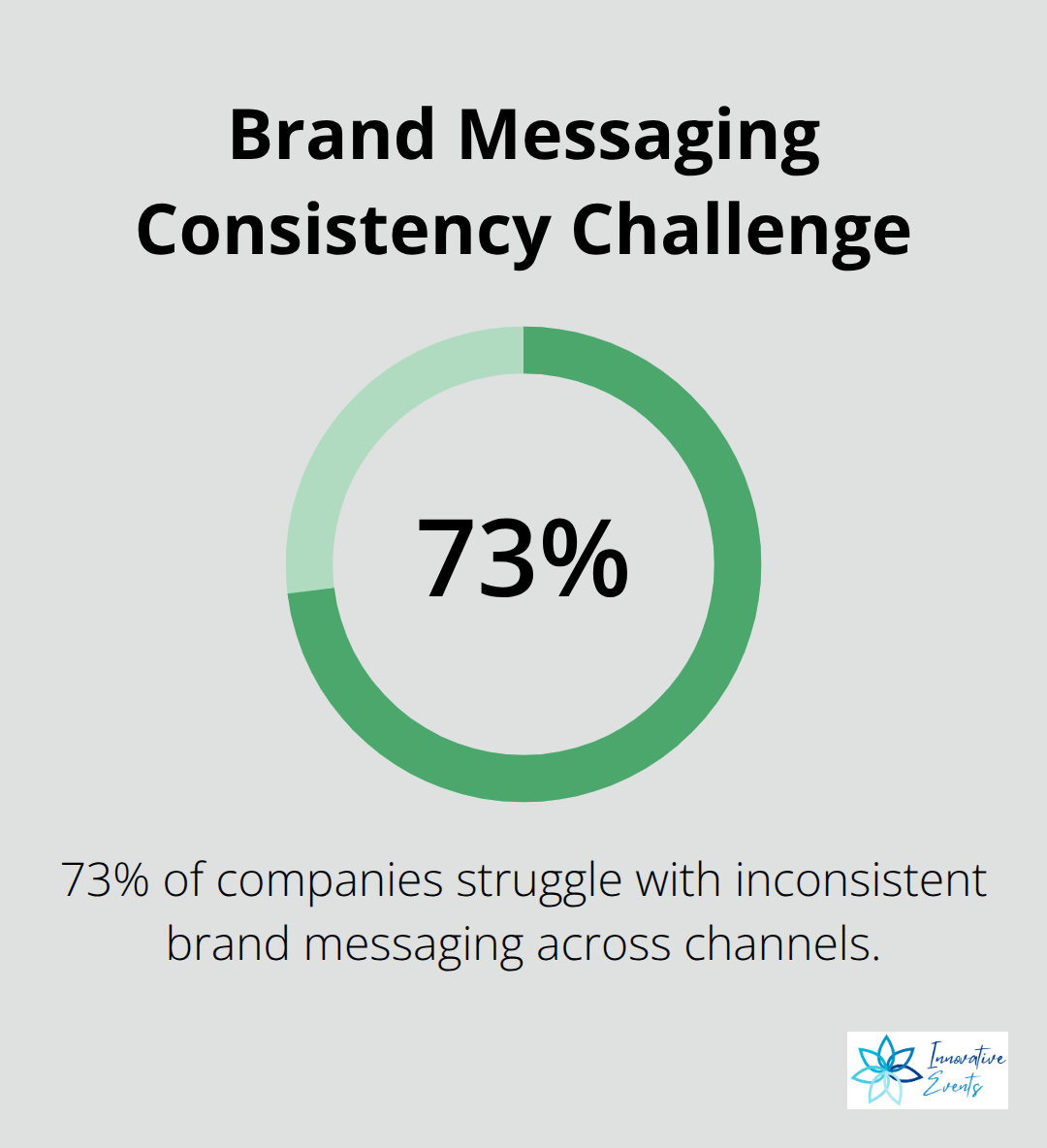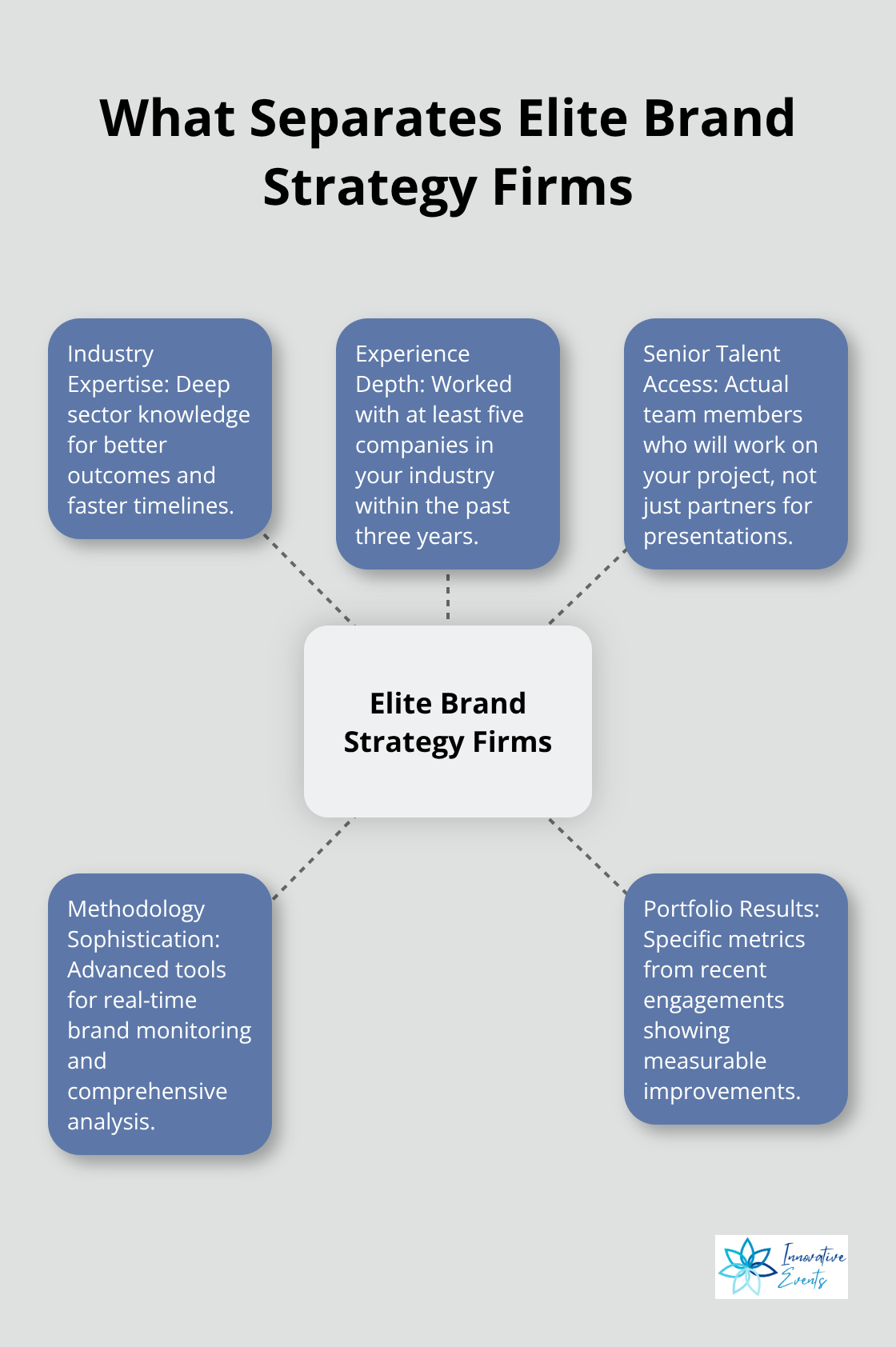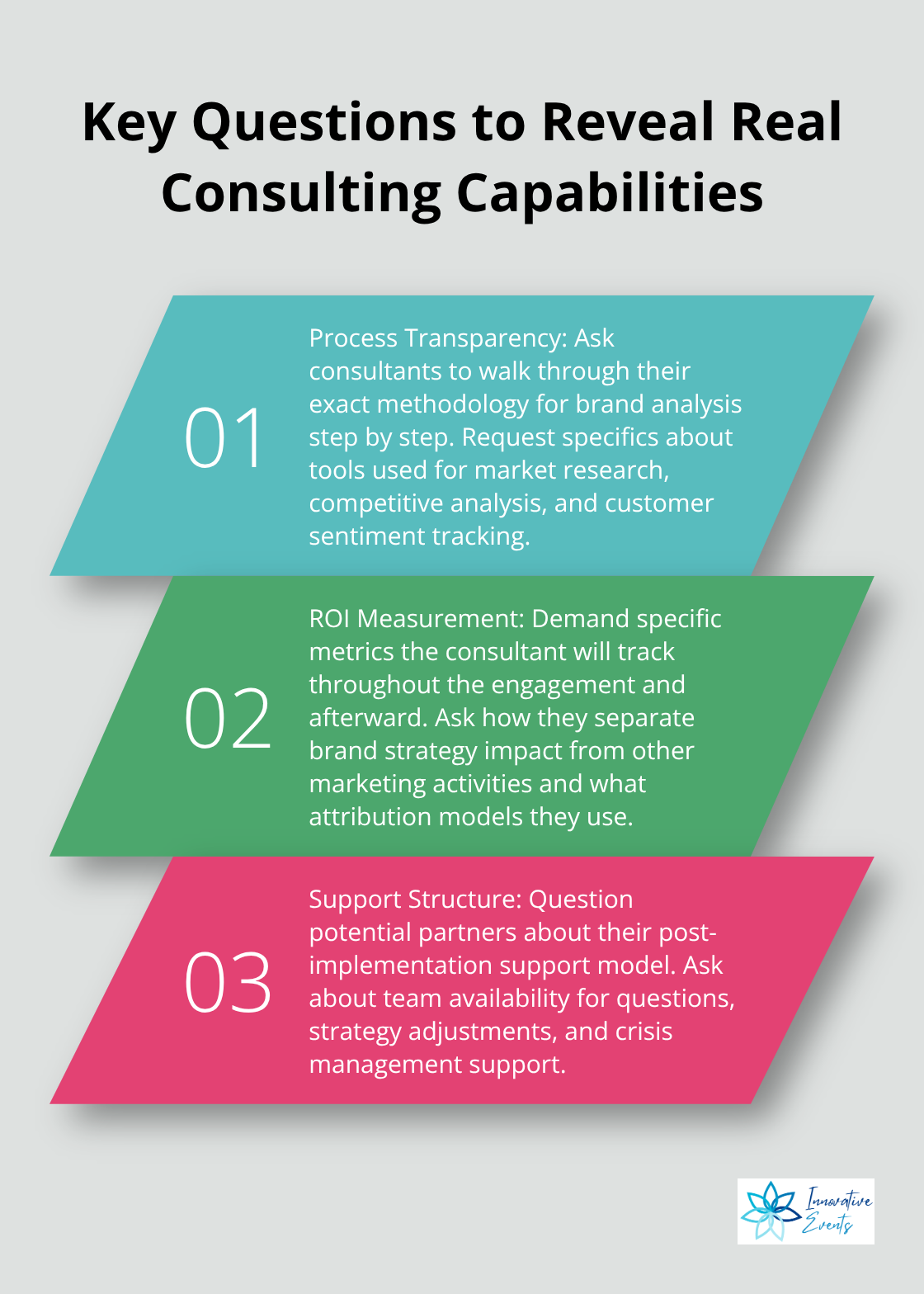Your brand strategy shapes every customer interaction and business decision. Yet 73% of companies struggle with inconsistent brand messaging across channels.

At Innovative Events, we’ve seen how the right brand strategy consulting firms transform businesses from confused market players into industry leaders. The selection process requires careful evaluation of expertise, methodology, and cultural alignment.
What Do You Need Before Choosing a Consultant
Most companies jump straight into consultant interviews without understanding their own brand challenges. This backwards approach wastes time and money. However, proper preparation through thorough brand audits leads to significantly better outcomes when working with consultants.
Start With Brutal Brand Honesty
Your current brand position determines everything. Run a comprehensive brand audit using tools like Brandwatch or Sprout Social to measure brand sentiment across digital platforms. Survey your existing customers about brand perception and compare results with competitor analysis. Companies that use data-driven brand assessments reduce consultant onboarding time by 40% because they provide clear baseline metrics. Document specific pain points like inconsistent messaging, declining market share, or poor brand recognition scores. This concrete data helps consultants understand your starting point and craft targeted solutions.
Set Measurable Goals and Realistic Timelines
Vague objectives lead to disappointing results. Define specific metrics like increasing brand awareness by 25% within 12 months or improving customer loyalty scores by 15 points. Research shows that companies with quantifiable goals achieve significantly better ROI than those with general objectives. Establish your budget range early (brand strategy consulting typically costs between $50,000 and $500,000 depending on scope and firm size). Timeline expectations matter too. Most comprehensive brand strategies require 6-12 months for development and another 12-18 months to show measurable market impact.
Identify Your Internal Resources and Constraints
Your team’s capacity affects consultant selection significantly. Assess whether your marketing department can dedicate 10-15 hours weekly to collaborating with external consultants. Companies with dedicated internal brand champions see 35% faster strategy implementation than those without assigned resources. Consider your company culture and decision-making processes (some firms work better with hierarchical structures, while others thrive with collaborative approaches). Document any regulatory constraints or industry-specific requirements that might limit strategic options.
With your brand assessment complete and objectives defined, you can now evaluate which type of consulting firm matches your specific needs and constraints.
What Separates Elite Brand Strategy Firms

Industry expertise matters more than impressive client names. Firms with deep sector knowledge understand regulatory constraints, competitive dynamics, and customer behavior patterns that generalist consultancies miss completely. Bain & Company’s specialized experience translates into faster project timelines and better outcomes.
Experience Depth Beats Breadth Every Time
Look for consultants who have worked with at least five companies in your industry within the past three years. Their case studies should show specific revenue increases, market share gains, or brand recognition improvements rather than vague success stories. Prophet’s dual focus on growth strategy and marketing gives it an edge over firms that treat brand strategy as an isolated exercise. Firms that understand your market dynamics reduce project risk and deliver more targeted solutions.
Senior Talent Access Determines Project Quality
Senior talent involvement determines project quality more than agency reputation. Many large firms assign junior consultants to execute strategies while partners only appear for initial presentations. Demand to meet the actual team members who will work on your project and review their individual track records. Boutique firms like Equibrand Consulting often provide better senior-level attention because they dedicate specialized teams solely to brand strategy rather than spread expertise across multiple service lines.
Methodology Sophistication Shows True Capabilities
Ask potential partners about their methodology for brand analysis. Firms that use advanced tools like Meltwater for real-time brand monitoring deliver more actionable insights than those that rely on outdated survey methods. The best consultants combine quantitative data analysis with qualitative customer research to create comprehensive brand strategies. Their approach should include competitor analysis, audience research, and market positioning frameworks (not just creative workshops and brainstorming sessions).
Portfolio Results Tell the Real Story
Past performance data beats marketing promises every time. Request specific metrics from recent engagements: brand awareness percentage increases, customer retention improvements, or revenue growth attributed to brand strategy changes. Siegel+Gale’s emphasis on simplicity has helped major clients like the U.S. Army achieve measurable brand clarity improvements. Avoid firms that only share generic testimonials without quantifiable results.
The best consultants provide detailed case studies that show before-and-after brand performance metrics, implementation timelines, and long-term business impact. Companies that choose consultants based on concrete results rather than presentation skills see better ROI from their brand investments.
With these evaluation criteria in mind, you need specific questions that reveal whether potential partners can deliver the results your brand requires.
What Questions Reveal Real Consulting Capabilities

The wrong questions waste everyone’s time while the right ones expose whether consultants can actually deliver results. Skip generic inquiries about company history or team size. Instead, focus on three specific areas that separate professional consultants from expensive presentation makers.
Process Transparency Shows Professional Standards
Ask consultants to walk through their exact methodology for brand analysis step by step. Demand specifics about which tools they use for market research, competitive analysis, and customer sentiment tracking. Professional firms will mention platforms like Brandwatch for social listening or specific frameworks for brand positioning without hesitation.
Request sample deliverables from similar projects, including brand audit templates, strategy frameworks, and implementation timelines. Consultants who refuse to share methodology details or provide vague responses about their process lack the structured approach needed for complex brand transformations.
The best firms will show you their proprietary tools and explain exactly how they gather data, analyze competitors, and develop strategic recommendations. Companies that choose consultants with transparent methodologies report higher satisfaction rates than those who select based on impressive presentations alone.
ROI Measurement Separates Professionals From Pretenders
Demand specific metrics that the consultant will track throughout the engagement and for at least 12 months afterward. Professional consultants should propose measurable outcomes like brand awareness increases, customer acquisition cost reductions, or market share improvements with baseline establishment methods.
Ask how they separate brand strategy impact from other marketing activities and what attribution models they use. Firms that mention tools like Google Analytics 4 or advanced marketing mix modeling show serious measurement capabilities (these tools indicate sophisticated tracking abilities).
Request examples of ROI calculations from previous clients with actual percentage improvements and revenue attribution. Avoid consultants who promise results but cannot explain their measurement methodology or provide concrete examples of past performance tracking.
Support Structure Determines Long-Term Success
Question potential partners about their post-implementation support model. Many firms disappear after strategy delivery, leaving companies to struggle with execution challenges. Professional consultants provide ongoing guidance through implementation phases and regular performance reviews.
Ask about team availability for questions, strategy adjustments, and crisis management support. The best firms assign dedicated account managers who understand your brand evolution and can adapt strategies based on market changes (this ongoing relationship proves invaluable during implementation).
Firms that offer comprehensive support packages typically charge higher fees but deliver significantly better long-term results than those focused solely on strategy development.
Final Thoughts
Brand strategy consulting firms deliver value through measurable outcomes and transparent processes rather than impressive presentations. Cultural alignment determines whether strategies get implemented successfully, so your chosen consultant must understand your company’s decision-making style and internal constraints. Firms that adapt their approach to your organizational culture provide smoother project execution and stronger results.
Request detailed proposals from three qualified firms and compare their methodologies, team assignments, and measurement frameworks directly. Schedule working sessions with potential partners to assess their communication styles and strategic thinking capabilities. The right partnership accelerates your brand evolution and creates lasting competitive advantages.
At Innovative Events, we help businesses transform their brand presence through strategic marketing and immersive experiences (our approach focuses on measurable outcomes that drive real business growth). The right consulting partnership positions your brand for sustained success in today’s competitive marketplace.

